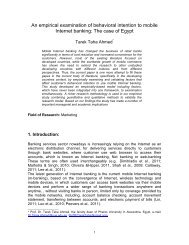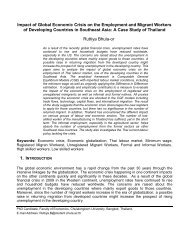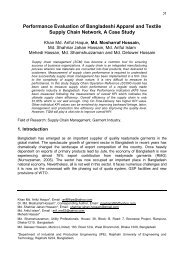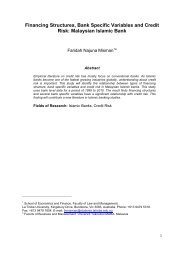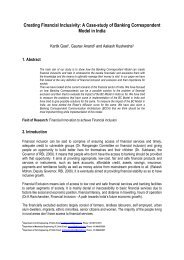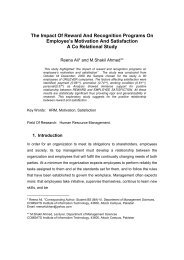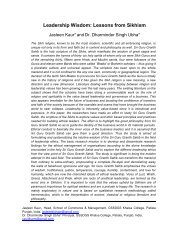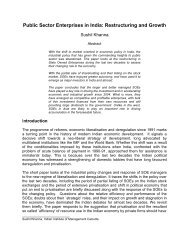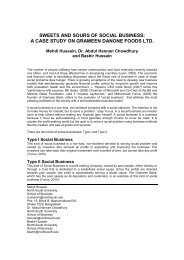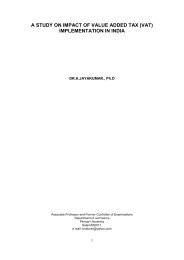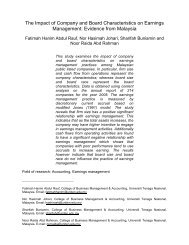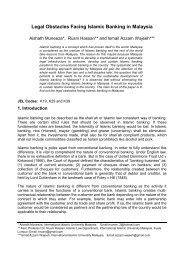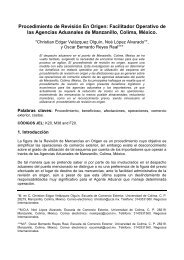Human resource management (HRM) has emerged as a key ...
Human resource management (HRM) has emerged as a key ...
Human resource management (HRM) has emerged as a key ...
- No tags were found...
Create successful ePaper yourself
Turn your PDF publications into a flip-book with our unique Google optimized e-Paper software.
Bangladesh. The study encomp<strong>as</strong>sed the <strong>HRM</strong> practices of Wartsila, one of theprivate sector power generation companies, and BPBD (Bangladesh PowerDevelopment Board), the public sector power generation company. Theyexamined recruitment, selection, training, performance appraisal, andcompensation practices of both the firms. The authors concluded that the overall<strong>HRM</strong> practices of Wartsila very much satisfactory. In contr<strong>as</strong>t, the <strong>HRM</strong> practicesof BPDB were quite inefficient. Huda, Karim and Ahmed (2007) made a study onthe <strong>HRM</strong> practices of 20 NGOs of Bangladesh. It w<strong>as</strong> identified from the studythat the HR challenges faced by the NGOs were shortage of qualifiedcandidates, insufficiency of qualified female candidate, poor academicbackground of applicants in the suburban and rural are<strong>as</strong>, and the lack of traininginfr<strong>as</strong>tructure and training need analysis. The first three challenges were relatedto recruitment. Two recent studies (Billah & Islam, 2009; Billah, Prince, & Islam,2009) found that HR practices have significant <strong>as</strong>sociation with employeeturnover and organizational commitment.The above literature survey on different <strong>HRM</strong> practices demonstrates that likeother developing countries, <strong>HRM</strong> <strong>as</strong> an area of research <strong>h<strong>as</strong></strong> not received properattention in Bangladesh. Moreover, few in-depth comparative studies betweenthe public and private sector in this context were conducted by the localresearchers. The study is, therefore, an endeavor to fill up this obvious researchgap.3. Research Objectives, Hypotheses, and MethodologyAlthough human <strong>resource</strong> <strong>management</strong> practices are indispensable in enhancingorganizational performance and competitive advantage (Becker & Huselid,1998), surprisingly an inadequate number of studies have been conducted in thisarea so far in Bangladeshi context (Akhter, 2002; Mahmood, 2004). This stillremains an unearthed area for research. Thus, the present study aimed at fillingthe existing research gap. This study would contribute to the progress of bettertheory and practice of <strong>HRM</strong>. The research findings would help the public and theprivate sector industrial enterprises of Bangladesh in realizing the status of their<strong>HRM</strong> practices. It would also help them improve their <strong>HRM</strong> practices towardscreating a sustainable competitive advantage b<strong>as</strong>ed on human capital. Theresearch findings would be also useful for the academicians, researchers, policymakers,and practitioners in recognizing <strong>HRM</strong> practices in a developing countrycontext such <strong>as</strong> Bangladesh. The study highlighted the following specificobjectives:a) To trace the overall status of <strong>HRM</strong> practices of the public sectorindustrial enterprises of Bangladesh.b) To trace the overall status of <strong>HRM</strong> practices of the private sectorindustrial enterprises of Bangladesh.c) To explore the difference between public and private sectorindustrial enterprises of Bangladesh with respect to overall statusof <strong>HRM</strong> practices.d) To put forward policy implications for overall improvement of the7



